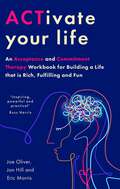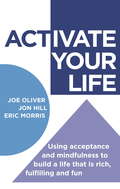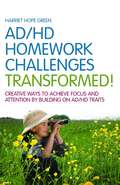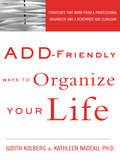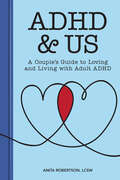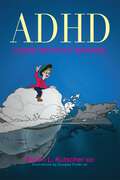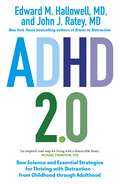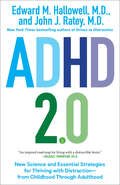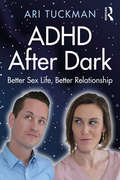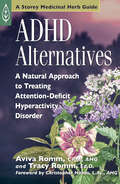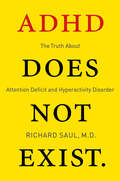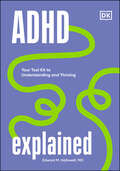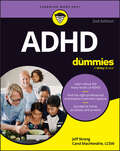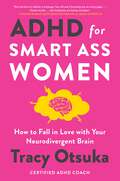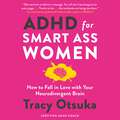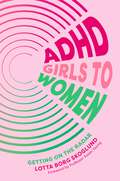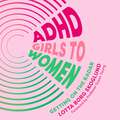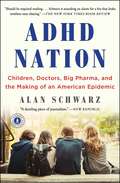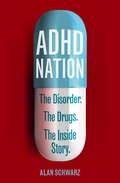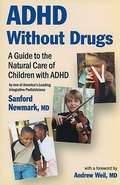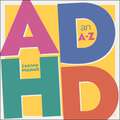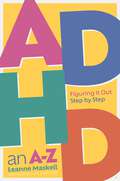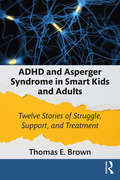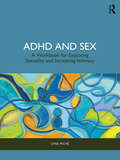- Table View
- List View
ACTivate Your Life: An Acceptance and Commitment Therapy Workbook for Building a Life that is Rich, Fulfilling and Fun
by Joe Oliver Jon Hill Eric MorrisEmbark on a remarkable journey of self-discovery and personal growth with ACTivate Your Life. This second edition, now in a user-friendly workbook format, equips you with powerful tools derived from Acceptance and Commitment Therapy (ACT) to help you set meaningful goals and breathe new life into your being.- A clear introduction to the ACT approach- Real life scenarios to make the examples come alive- Workbook activities for clinicians and clientsLearn to enhance your life skills and change your behaviour for the better!
ACTivate Your Life: An Acceptance and Commitment Therapy Workbook for Building a Life that is Rich, Fulfilling and Fun
by Joe Oliver Jon Hill Eric MorrisEmbark on a remarkable journey of self-discovery and personal growth with ACTivate Your Life. This second edition, now in a user-friendly workbook format, equips you with powerful tools derived from Acceptance and Commitment Therapy (ACT) to help you set meaningful goals and breathe new life into your being.- A clear introduction to the ACT approach- Real life scenarios to make the examples come alive- Workbook activities for clinicians and clientsLearn to enhance your life skills and change your behaviour for the better!
ACTivate Your Life: Using acceptance and mindfulness to build a life that is rich, fulfilling and fun
by Joe Oliver Jon Hill Eric MorrisACTivate Your Life focuses on helping people to be more open, connected and engaged with their lives, demonstrating how Acceptance Commitment Therapy can be used to tackle a range of problems such as low self-esteem, anxiety, anger and depression, as well as providing skills for life enhancement and self-development. Readers are encouraged to consider what matters to them and will learn techniques to set life directions based on meaningful values. Readers will also be introduced to mindfulness and learn how to use it in everyday life to connect with their actions, experiences and the people around them. The ACT approach also teaches that it's a normal part of being human to have thoughts and feelings that are unpleasant and the most important thing is to respond effectively when these kinds of experiences arise. The book is aimed at anyone wanting to enhance their life skills, and character stories are used to demonstrate the spectrum of how they might be employed.
AD/HD Homework Challenges Transformed!: Creative Ways to Achieve Focus and Attention by Building on AD/HD Traits
by Harriet Hope GreenHomework time can be an ordeal for children with AD/HD. After a long day at school, the child often struggles to concentrate and becomes restless, and the parent is left feeling helpless. With the right strategies, homework can be made a more tolerable and even enjoyable experience for both parent and child. This is a book filled with inspiring methods to motivate children with AD/HD at homework time. Common techniques such as enforcing restrictions and rigid timing techniques can stifle the joy of learning. This book focuses on empowering and enabling the child, acknowledges the characteristics of AD/HD and engages the positive side of these traits. Encouraging movement and creativity, the chapters are brimming with great ideas such as scavenger hunts, singing spelling games and jumping math quizzes that hold the child's attention and make learning fun. By adopting these simple strategies into the daily routine of a child with AD/HD, parents and teachers can take the tears and tantrums out of homework time and pave the way for academic success.
ADD-FRIENDLY Ways To ORGANIZE Your Life
by Kathleen Nadeau Judith KolbergOrganizing books fall short of addressing the unique needs of adults with ADD. They fail to understand the clinical picture of ADD and how it impacts the organizing process, often making their advice irrelevant or frustrating when put into practice. Books about ADD may address organization/disorganization but do so in a cursory fashion and on a very small scale. This is a book that has ADD-Friendly advice with the ADD-er in mind. This collaboration brings forth the best underlying understanding with the most effective and practical remedy from ADD experts in two important fields-professional organization and clinical psychology. Finally, it offers organizing advice that ranges from self-help to utilizing the help of non-professionals, to using professional assistance. Thus it permits the listener to decide where they are personally in the organizing process, and what level of support will be most beneficial to their unique situation.
ADHD & Us: A Couple's Guide to Loving and Living With Adult ADHD
by Anita Robertson LCSWNavigating adult ADHD in your relationship—simple, effective strategies to strengthen your commitment Communicating and thriving in a neurodiverse relationship is possible. ADHD & Us gives couples the tools and strategies they need to connect as well as overcome the unique challenges they face on the road to long-term happiness and satisfaction. Drawing from Anita Robertson's years of practice counseling couples with ADHD (attention-deficit/hyperactivity disorder), this honest and straightforward guide helps couples better understand adult ADHD and how it affects relationships, while also providing the tools necessary for both partners to feel understood and respected. Learn how to avoid common conflicts, appreciate your differences, and meet each partner's needs. Together, you can make it happen. This relationship guide for people with adult ADHD includes: Five pillars of success—Learn about the five relationship pillars—praise, acknowledgement, games, growth mindset, and positive acceptance—and how they are essential in a successful relationship. A practical approach to adult ADHD—Build communication skills and deepen your connection using engaging exercises that allow both partners to share in safe and constructive ways. Modern and inclusive guidance—With expert advice based on the most-up-to-date understandings of adult ADHD, this book is designed for use in all kinds of relationships. Overcome the challenges of dealing with adult ADHD and thrive together with this simple, actionable guide.
ADHD - Living without Brakes
by Martin L. KutscherThis concise and highly accessible book contains everything that parents and busy professionals need to know about ADHD. The author describes the spectrum of ADHD, the co-occurring symptoms, and common difficulties that parents face. The rest of the book focuses on solutions, based around four rules. Rule number one is keeping it positive: punishments can change behavior, but only positive approaches can improve attitude. Rule number two is keeping it calm: it's difficult thinking clearly enough to solve problems logically if you are feeling overwhelmed. Rule number three is keeping it organized: this rule relates particularly to the child's school life. Rule number four is to keep doing rules one to three..Finally, Dr. Kutscher discusses the role of medication for treating ADHD. The concluding chapter summarizes the information covered and can also be read as a complete, freestanding text. Useful checklists and further reading recommendations are also included. Realistic and optimistic, this book is the ideal source of information and advice for parents and professionals who are trying to keep up with children who are living without brakes.
ADHD 2.0: New Science and Essential Strategies for Thriving with Distraction - from Childhood through Adulthood
by Edward M. Hallowell John J. Ratey'An inspired road map for living with a distractible brain... If you or your child suffer from ADHD, this book should be on your shelf. It will give you courage and hope'. Michael Thompson, PhD, New York Times bestselling co-author of Raising CainWorld-renowned authors Dr Edward M. Hallowell and Dr John J. Ratey literally 'wrote the book' on ADD/ADHD more than two decades ago. Their bestseller, Driven to Distraction, largely introduced this diagnosis to the public and sold more than a million copies along the way.Now, most people have heard of ADHD and know someone who may have it. But lost in the discussion of both childhood and adult diagnosis of ADHD is the potential upside: many hugely successful entrepreneurs and highly creative people attribute their achievements to ADHD. Also unknown to most are the recent research developments, including innovations that give a clearer understanding of the ADHD brain in action. In ADHD 2.0, Drs Hallowell and Ratey, both of whom have this 'variable attention trait', draw on the latest science to provide both parents and adults with ADHD a plan for minimizing the downside and maximizing the benefits of ADHD at any age. They offer an arsenal of new strategies and lifestyle hacks for thriving with ADHD, including:- Find the right kind of difficult. Use these behaviour assessments to discover the work, activity, or creative outlet best suited to an individual's unique strengths.- Reimagine environment. What specific elements to look for - at home, at school, or in the workplace - to enhance the creativity and entrepreneurial spirit inherent in the ADHD mind.- Embrace innate neurological tendencies. Take advantage of new findings about the brain's default mode network and cerebellum, which confer major benefits for people with ADHD.- Tap into the healing power of connection. Tips for establishing and maintaining positive connection, 'the other Vitamind C', and the best antidote to the negativity that plagues so many people with ADHD.- Consider medication. Gets the facts about the underlying chemistry, side effects, and proven benefits of all the pharmaceutical options.As inspiring as it is practical, ADHD 2.0 will help you tap into the power of this mercurial condition and find the key that unlocks potential.
ADHD 2.0: New Science and Essential Strategies for Thriving with Distraction--from Childhood through Adulthood
by Edward M. Hallowell John J. RateyA revolutionary new approach to ADD/ADHD featuring cutting-edge research and strategies to help readers thrive, by the bestselling authors of the seminal books Driven to Distraction and Delivered from Distraction&“An inspired road map for living with a distractible brain . . . If you or your child suffer from ADHD, this book should be on your shelf. It will give you courage and hope.&”—Michael Thompson, Ph.D., New York Times bestselling co-author of Raising CainWorld-renowned authors Dr. Edward M. Hallowell and Dr. John J. Ratey literally &“wrote the book&” on ADD/ADHD more than two decades ago. Their bestseller, Driven to Distraction, largely introduced this diagnosis to the public and sold more than a million copies along the way.Now, most people have heard of ADHD and know someone who may have it. But lost in the discussion of both childhood and adult diagnosis of ADHD is the potential upside: Many hugely successful entrepreneurs and highly creative people attribute their achievements to ADHD. Also unknown to most are the recent research developments, including innovations that give a clearer understanding of the ADHD brain in action. In ADHD 2.0, Drs. Hallowell and Ratey, both of whom have this &“variable attention trait,&” draw on the latest science to provide both parents and adults with ADHD a plan for minimizing the downside and maximizing the benefits of ADHD at any age. They offer an arsenal of new strategies and lifestyle hacks for thriving with ADHD, including• Find the right kind of difficult. Use these behavior assessments to discover the work, activity, or creative outlet best suited to an individual&’s unique strengths.• Reimagine environment. What specific elements to look for—at home, at school, or in the workplace—to enhance the creativity and entrepreneurial spirit inherent in the ADHD mind.• Embrace innate neurological tendencies. Take advantage of new findings about the brain&’s default mode network and cerebellum, which confer major benefits for people with ADHD.• Tap into the healing power of connection. Tips for establishing and maintaining positive connection &“the other Vitamind C&” and the best antidote to the negativity that plagues so many people with ADHD.• Consider medication. Gets the facts about the underlying chemistry, side effects, and proven benefits of all the pharmaceutical options. As inspiring as it is practical, ADHD 2.0 will help you tap into the power of this mercurial condition and find the key that unlocks potential.
ADHD After Dark: Better Sex Life, Better Relationship
by Ari TuckmanThis pioneering book explores the impact of ADHD on a couple’s sex life and relationship. It explains how a better sex life will benefit your relationship (and vice versa) and why that’s especially important for couples with one partner with ADHD. Grounded in innovative research, ADHD After Dark draws on data from a survey of over 3000 adults in a couple where one partner has ADHD. Written from the author’s unique perspective as both an expert in ADHD and a certified sex therapist, the book describes the many effects of ADHD on couples’ sex lives and happiness, covering areas such as negotiating sexual differences, performance problems, low desire, porn, making time for sex, infidelity, and more. The book outlines key principles for a great sex life for couples with ADHD and offers strategies and treatment interventions where specific issues arise. Written in a readable and entertaining style, ADHD After Dark offers clear information on sexuality and relationships and is full of valuable advice on how to improve both. This guide will be an essential read for adults with ADHD, as well as their partners or spouses, and therapists who work with ADHD clients and couples.
ADHD Alternatives: A Natural Approach to Treating Attention Deficit Hyperactivity Disorder
by Aviva J. Romm C.P.M. Tracy Romm Ed.D. Christopher Hobbs L.Ac. AhgAttention-deficit hyperactivity disorder (ADHD) is one of the most commonly diagnosed, and misdiagnosed, disorders in children. <P><P>This guide focuses on the root causes of ADHD and offers a natural and holistic approach to combat the disorder, encouraging families to find solutions that don’t rely on psychostimulant drugs like Ritalin. <P><P>Discover the many benefits of treating ADHD with a mixture of nutritional supplements, herbal medicines, and parenting techniques that foster self-esteem, creativity, self-discipline, and confidence.
ADHD Does not Exist
by Richard SaulA radical new response to a widely misunderstood conditionWe are witnessing a global epidemic of attention deficit and hyperactivity disorder. Millions are suffering from attention issues, while millions more are reliant on stimulant medication to perform at school and at work. Despite decades of advancements in neuroscience, the definition of ADHD has remained essentially unchanged since its introduction in 1980, and its prevalence in the population has skyrocketed.In this controversial and landmark work, Dr. Richard Saul draws from five decades as a practicing physician and researcher in the field to contend that the definition of ADHD as we know it is completely wrong. Instead, he argues that the "disorder" is a cluster of symptoms stemming from more than twenty other conditions, each requiring separate treatment. The detailed list ranges from mild problems like poor eyesight, sleep deprivation, and even boredom in the classroom, to more severe conditions like depression and bipolar disorder.Through the lens of history and into the present day, Dr. Saul examines "ADHD," exploring the rising cultural and medical trends that have birthed the stimulant epidemic. Both comprehensive and illuminative, ADHD Does Not Exist is essential reading for doctors, practitioners, educators, and individuals who are seeking an honest approach to understanding and treating this complex condition.
ADHD Explained: Your Toolkit to Understanding and Thriving
by Edward HallowellA NYT best-selling doctor and TikToker offers a collection of quick-read insights to help a newly diagnosed generation understand ADHDWith a new wave of adult ADHD diagnoses sweeping the world, many are only just beginning to discover what it is that sets them apart, but few have learned what it takes to thrive ….World-renowned ADHD expert, best-selling author, and TikTok sensation Dr. Edward M. Hallowell (a.k.a. Dr. Ned) demystifies this deeply misunderstood diagnosis in 100 lessons. What does ADHD tell us about our brains and how we think and act? Can it limit opportunities and connection? Does it offer cerebral superpowers? What strategies and medication can help lessen the difficulties of ADHD and instead boost its benefits? Through simple science and must-know life hacks, FAQs, and debunked myths, transform your understanding of ADHD and learn to thrive. Each empowering page will unlock the potential and finally let people see the best in their or their friends&’, family members', or colleagues&’ ADHD. This is a fast-track introduction to ADHD—what it is, how it manifests, and ways to cope with it—inspired by Dr. Ned&’s viral videos, better known as "NedTalks." Brief entries and an easy-to-follow structure disseminate knowledge and the latest scientific findings in a style particularly suited to ADHD readers. As both an ADHD expert and a diagnosed patient, Dr. Ned blends a medical and personal take on the topic in this groundbreaking guide.
ADHD For Dummies
by Jeff Strong Carol MacHendrieDemystify ADHD with simple explanations of the basics and the latest research Attention deficit hyperactivity disorder (ADHD) is one of the most globally prevalent neurodevelopmental disorders. ADHD For Dummies explores living a healthy and fulfilling life with ADHD, from seeking diagnosis to choosing the right treatment path for you or your loved one. You’ll read about the latest in ADHD research, equipping you with valuable knowledge as you care for a child with ADHD or explore your own ADHD symptoms as an adult. This book provides the answers you need on how to deal with day-to-day challenges at home, school, and work, and how to find support and counseling. With appropriate management, anyone can live a great life with ADHD. Learn what ADHD is—and what it isn’t Get up to date with the latest information on ADHD, including medications and non-medical treatments Find the right professional to help you get the support you or your children needThis is the perfect Dummies guide for both parents of children with ADHD and adults with ADHD looking to learn more. Teachers, counselors, and therapists—this is also a great resource to educate yourself and your clients.
ADHD For Smart Ass Women: How to fall in love with your neurodivergent brain
by Tracy OtsukaADHD is one of the most common neurological disorders in the United States - yet a staggering 75 percent of girls and women remain undiagnosed. Due to the gender gap in medical research, which does not account for symptoms manifesting differently in women - leading to increased problems with anxiety, depression, working memory, sleep, energy and concentration - many ADHD women are left to navigate a society that fails to understand their struggles and gifts. But what if every woman had the resources and support to uncover the hidden wonders of her neurodivergent brain?Enter certified ADHD coach and podcast host Tracy Otsuka. Armed with her experience coaching thousands of women, cutting-edge medical research and personal insights from her own diagnosis, she presents a revelatory guide tailored specifically for girls and women with ADHD. In it, Otsuka offers an entirely new set of tools, systems, and strategies to access a world of boundless productivity, focus, and confidence.With her signature wit and levity - in entertaining chapters designed for ADHD readers - Otsuka explores the unique challenges that ADHD women face and illuminates the extraordinary qualities that set them apart: overflowing creativity, laser-focused attention, deep empathy, and fearless entrepreneurial spirit. Even without an official diagnosis, readers will be equipped with the tools to conquer any to-do list and to tap into their true purpose, personally or professionally. Otsuka offers a beacon of hope for any woman looking to transform her symptoms into strengths. Comprehensive, lively and long overdue, ADHD for Smart Ass Women is the key to unlocking unparalleled potential and to understanding your truly magnificent and brilliant brain.
ADHD For Smart Ass Women: How to fall in love with your neurodivergent brain
by Tracy OtsukaADHD is one of the most common neurological disorders in the United States - yet a staggering 75 percent of girls and women remain undiagnosed. Due to the gender gap in medical research, which does not account for symptoms manifesting differently in women - leading to increased problems with anxiety, depression, working memory, sleep, energy and concentration - many ADHD women are left to navigate a society that fails to understand their struggles and gifts. But what if every woman had the resources and support to uncover the hidden wonders of her neurodivergent brain?Enter certified ADHD coach and podcast host Tracy Otsuka. Armed with her experience coaching thousands of women, cutting-edge medical research and personal insights from her own diagnosis, she presents a revelatory guide tailored specifically for girls and women with ADHD. In it, Otsuka offers an entirely new set of tools, systems, and strategies to access a world of boundless productivity, focus, and confidence.With her signature wit and levity - in entertaining chapters designed for ADHD readers - Otsuka explores the unique challenges that ADHD women face and illuminates the extraordinary qualities that set them apart: overflowing creativity, laser-focused attention, deep empathy, and fearless entrepreneurial spirit. Even without an official diagnosis, readers will be equipped with the tools to conquer any to-do list and to tap into their true purpose, personally or professionally. Otsuka offers a beacon of hope for any woman looking to transform her symptoms into strengths. Comprehensive, lively and long overdue, ADHD for Smart Ass Women is the key to unlocking unparalleled potential and to understanding your truly magnificent and brilliant brain.
ADHD Girls to Women: Getting on the Radar
by Lotta Borg SkoglundADHD girls and women often fall under the radar. Their lives impacted by a society that is largely disinterested in understanding ADHD outside of the male framework. No longer. This book connects the latest science on ADHD in women to the compelling lived experiences of girls and women with ADHD, weaving in their personal struggles and their breakthroughs, from childhood and the teen years through to motherhood, menopause and beyond.Family doctor, psychiatrist, and international ADHD expert Lotta Borg Skoglund combines years of experience in the treatment and assessment of ADHD with the powerful testimonies of the women she has encountered along the way, exploring issues such as hormonal changes, emotional regulation, organisation and concentration, relationships, work, and treatment. She provides valuable tips, strategies and insights as to how ADHD girls and women can achieve the self-understanding they need to live to their best potential.
ADHD Girls to Women: Getting on the Radar
by Lotta Borg SkoglundPopular science audiobook on ADHD in women interspersed with real stories from amazing ADHD womenADHD girls and women often fall under the radar. This rigorous and accessible audiobook connects current research (which until recently has mostly focused on men) to the lived experiences of girls and women with ADHD, weaving in their personal struggles and breakthroughs throughout their lives from childhood and the teen years through to motherhood, menopause and beyond.Family doctor, psychiatrist, and international ADHD expert Lotta Borg Skoglund combines years of experience in the treatment and assessment of ADHD with the powerful testimonies of the women she has encountered along the way, exploring issues such as hormonal changes, emotional regulation, organisation and concentration, relationships, work, and treatment. She provides valuable tips and insights along with powerful strategies as to how ADHD girls and women can achieve the self-understanding they need to live lives to their best potential.(P)2023 Jessica Kingsley Publishers
ADHD Nation: Children, Doctors, Big Pharma, and the Making of an American Epidemic
by Alan SchwarzThe groundbreaking and definitive account of the widespread misdiagnosis of attention deficit hyperactivity disorder--and how its unchecked growth over half a century has made ADHD one of the most controversial conditions in medicine, with serious effects on children, adults, and society.More than 1 in 7 American children get diagnosed with ADHD--three times what experts have said is appropriate--meaning that millions of kids are misdiagnosed and taking medications such as Adderall or Concerta for a psychiatric condition they probably do not have. The numbers rise every year. And still, many experts and drug companies deny any cause for concern. In fact, they say that adults and the rest of the world should embrace ADHD and that its medications will transform their lives. In ADHD Nation, Alan Schwarz examines the roots and the rise of this cultural and medical phenomenon: The father of ADHD, Dr. Keith Conners, spends fifty years advocating drugs like Ritalin before realizing his role in what he now calls "a national disaster of dangerous proportions"; a troubled young girl and a studious teenage boy get entangled in the growing ADHD machine and take medications that backfire horribly; and big Pharma egregiously over-promotes the disorder and earns billions from the mishandling of children (and now adults). While demonstrating that ADHD is real and can be medicated when appropriate, Schwarz sounds a long-overdue alarm and urges America to address this growing national health crisis.
ADHD Nation: The disorder. The drugs. The inside story.
by Alan SchwarzAttention Deficit Hyperactivity Disorder (ADHD) will soon be the most frequently diagnosed chronic condition among children, surpassing asthma. Yet research shows that ADHD can't be that prevalent. ADHD, a problem once thought to affect a small percentage of children, has exploded into one of the most misdiagnosed psychiatric conditions. Now doctors and Big Pharma are targeting children and adults worldwide to get the diagnosis and take medications that will, they say, transform their lives. In ADHD Nation, acclaimed New York Times journalist Alan Schwarz takes readers behind the scenes to tell the full story of this billion-dollar industry. There's the father of ADHD, Dr Keith Conners, who spent fifty years promoting the disorder in the US and pills like Ritalin before realising just what he had wrought; a troubled young girl and studious, teenage boy who get entangled in the ADHD machine and are prescribed medications that lead to serious problems; and the pharmaceutical industry that promoted the disorder and continues to earn billions from the rampant mishandling of ADHD. An investigation of how Big Pharma and medical professionals are complicit in the creation, maintenance and continuing expansion of the ADHD industry, this book sounds the alarm for UK readers and demands we wake up to the problem that we too could face in the future.
ADHD Without Drugs: A Guide To The Natural Care Of Children With ADHD
by Andrew Weil Sanford NewmarkFor 20 years, Dr. Sandy Newmark has specialized in successfully treating children diagnosed as having ADHD using methods other than psychostimulant medications. Now he has put his best advice into a new book, ADHD Without Drugs: A Guide to the Natural Care of Children with ADHD. This book is written for every adult who cares for or influences the care of children with ADHD: parents first and foremost, plus caregivers, coaches, counselors, educators, physicians, psychiatrists, social workers and therapists -- anyone who wants to learn how to better help all children with ADHD succeed. In the book, Dr. Newmark explains how to treat the whole child, not just the symptoms of ADHD, using safe and natural methods. His successful treatment strategies are written in plain language that parents can understand easily and implement immediately. He also dispels the myths and misinformation surrounding ADHD, as he explains the latest research concerning what ADHD actually is, what causes it, and how it can be treated. For those children who do need conventional medical treatment, he presents a research-based evaluation of the benefits and risks of the most common ADHD medications. Parents of any child suspected of or diagnosed with ADHD, even those already taking medication, will find this book invaluable for their child's health, happiness, and success.
ADHD an A-Z: Figuring it Out Step by Step
by Leanne MaskellA guide to navigating life as a young adult with ADHD - from someone who's been through it allNavigating the world with an ADHD brain can be exhausting. The rollercoaster ride from clinical assessments through diagnosis to treatment can leave you feeling anxious and isolated, worried about failing or feeling different.This handy guide is here to change all that. If you have (or suspect you have) ADHD, you'll know the frustration of being given neurotypical or clinical advice - but this is straight from an ADHD brain to you.The accessible A-Z format, covering everything from burnout and finances to time management and relationships, gives you the tips and confidence you need to reach your full potential. It empowers you to understand why ADHD brains work the way they do and how to harness your unique mind to think creatively and overcome any hurdle life throws at you.Easy to digest and full to the brim with practical life advice including budgeting plans for impulsive spending, advice on rejection sensitive dysphoria and ways to relax, this audiobook provides everything you need to feel confident and supported through your ADHD diagnosis and beyond.(P) 2022 Jessica Kingsley Publishers
ADHD an A-Z: Figuring it Out Step by Step
by Leanne MaskellNavigating the world with an ADHD brain can be exhausting. The rollercoaster ride from clinical assessments through diagnosis to treatment can leave you feeling anxious and isolated, worried about failing or feeling different.This handy guide is here to change all that. If you have (or suspect you have) ADHD, you'll know the frustration of being given neurotypical or clinical advice - but this is straight from an ADHD brain to you.The accessible A-Z format, covering everything from burnout and finances to time management and relationships, gives you the tips and confidence you need to reach your full potential. It empowers you to understand why ADHD brains work the way they do and how to harness your unique mind to think creatively and overcome any hurdle life throws at you.Easy to digest and full to the brim with practical life advice including budgeting plans for impulsive spending, advice on rejection sensitive dysphoria and ways to relax, this book provides everything you need to feel confident and supported through your ADHD diagnosis and beyond.
ADHD and Asperger Syndrome in Smart Kids and Adults: Twelve Stories of Struggle, Support, and Treatment
by Thomas E. BrownADHD and Asperger Syndrome in Smart Kids and Adults offers detailed examples of individuals who have above-average cognitive intelligence, but struggle with executive function impairments of ADHD and significant social-emotional impairments of Asperger syndrome. The book centers around twelve case studies of bright children, teens, and adults treated for both ADHD and Asperger syndrome. Each chapter describes diverse examples of their strengths and their difficulties and explains how these individuals can be helped with appropriate treatment to overcome their ADHD impairments and to improve their ability to understand and interact more effectively with others. Case examples are followed by updated, science-based descriptions of these disorders. Providing science-based information about ADHD and Asperger syndrome in clearly understandable, accessible language, this text is ideal for clinicians, educators, social workers, medical and mental health service providers, and parents of those struggling with such impairments. It also advocates for restoring the diagnosis of Asperger Syndrome to diagnostic manuals of the American Psychiatric Association and World Health Organization.
ADHD and Sex: A Workbook for Exploring Sexuality and Increasing Intimacy
by Lyne PichéThis innovative workbook allows couples and individuals to explore the intersection of ADHD and sexuality and its many manifestations in a couple’s sex life and relationship.With useful and practical interventions provided to help identify and address common sexual problems, Dr. Lyne Piché provides individuals with tools to better communicate their needs to improve intimacy. Chapters discuss how to better maintain attention and focus during sex, explore grounding strategies to help individuals get in touch with their bodies and encourage individuals to confront anxieties surrounding sexual pleasure, sexual transitions and address common sexual problems. Through these exercises and discussions, individuals and couples alike can feel empowered to develop a sexual plan and outline ways to improve communication, break down barriers and discover the advantages of ADHD.This book is essential for adults with ADHD looking to embrace their sexuality, partners of neurodivergent adults, as well as therapists, counselors and coaches who work with neurodivergent clients.
